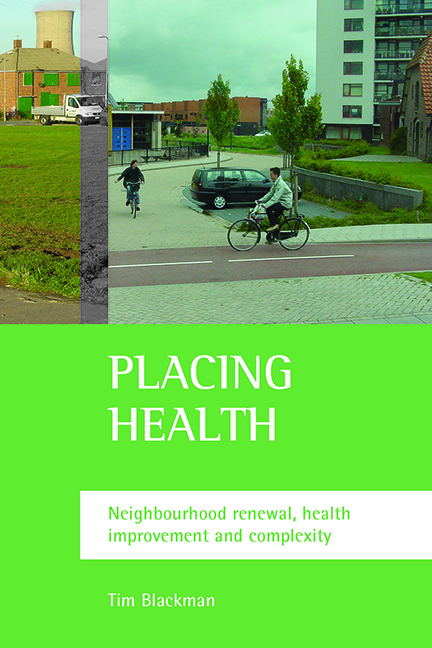Book contents
- Frontmatter
- Dedication
- Contents
- List of tables and figures
- Acknowledgements
- List of abbreviations
- Preface
- one Policy and places
- two Health, neighbourhoods and complexity
- three Emergence and environment press
- four The neighbourhood effect
- five Neighbourhood renewal and health inequalities
- six Health inequality as a policy priority
- seven Conclusion: neighbourhoods in the wider picture
- References
- Index
- Also available from The Policy Press
six - Health inequality as a policy priority
Published online by Cambridge University Press: 18 January 2022
- Frontmatter
- Dedication
- Contents
- List of tables and figures
- Acknowledgements
- List of abbreviations
- Preface
- one Policy and places
- two Health, neighbourhoods and complexity
- three Emergence and environment press
- four The neighbourhood effect
- five Neighbourhood renewal and health inequalities
- six Health inequality as a policy priority
- seven Conclusion: neighbourhoods in the wider picture
- References
- Index
- Also available from The Policy Press
Summary
The Black report, published in 1980, is often cited as the key reference point for when health inequality was placed on the national policy agenda in the UK (Black et al, 1980). Its recommendations, however, were rejected as too costly by the then Conservative government which the previous year had replaced the Labour administration that had commissioned the report. Health inequality, though, would not go away as an issue, with continuing pressure from public health movements such as the WHO's ‘Health for All’ campaign and Healthy Cities Project (Ashton and Seymour, 1988). Nevertheless, public health policy under the Conservatives concentrated on specific disease prevention strategies rather than health inequalities or the wider determinants of health beyond individual lifestyles. Targets for reducing both major diseases and individual risk factors were set out in England's Health of the Nation strategy (DH, 1992). The strategy acknowledged ‘health variations’ that were linked to socioeconomic factors but essentially dismissed the issue as not well understood.
Labour returned to power in 1997 and, in social policy, developed alongside a number of new national measures a swathe of ABIs aimed at tackling ‘social exclusion’, including the NR strategy and HAZs (SEU, 2001; Barnes, M. et al, 2005). The new government commissioned an update of the evidence on health inequality from a working group led by Professor Donald Acheson, which reported in 1998 (Acheson, 1998). This recommended evaluating all public policies for their impact on health inequalities, prioritising the health of families with children because of the significance of early-life influences on health, and taking further measures to tackle health inequalities and improve the living standards of poorer households. The report was followed by a new national strategy for England, Saving Lives: Our Healthier Nation (Secretary of State for Health, 1998) and in Scotland and Wales, which from 1998 had devolved governments with responsibility for health policy, by Towards a Healthier Scotland ( Secretary of State for Scotland, 1999) and Better Health: Better Wales (Secretary of State for Wales, 1998). Targets were set in these strategies for reducing death rates from cancer, CHD and stroke, accidents and mental illness. The strategies also recognised the importance of tackling social, economic and environmental factors, and of partnership working between the NHS, local government and the voluntary and community sectors.
- Type
- Chapter
- Information
- Placing HealthNeighbourhood Renewal, Health Improvement and Complexity, pp. 141 - 176Publisher: Bristol University PressPrint publication year: 2006



